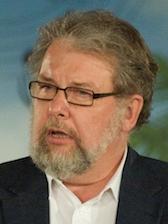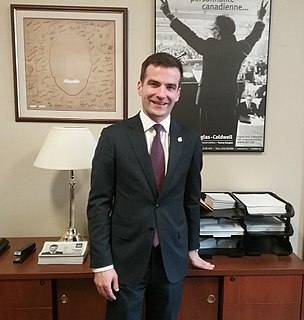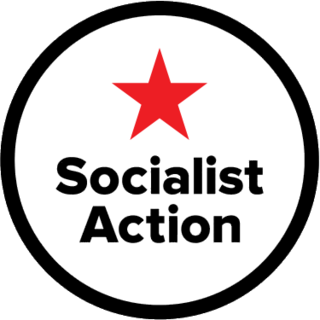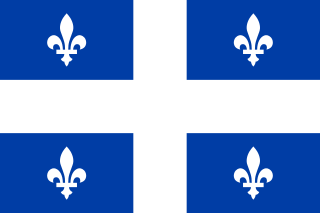
The Bloc Québécois (BQ) is a federal political party in Canada devoted to Quebec nationalism and the promotion of Quebec sovereignty. The Bloc was formed by Members of Parliament who defected from the federal Progressive Conservative Party and Liberal Party during the collapse of the Meech Lake Accord. Founder Lucien Bouchard was a cabinet minister in the federal Progressive Conservative government of Brian Mulroney.

William Alexander "Bill" Blaikie, is a Canadian retired politician. He was a Member of Parliament (MP) from 1979 to 2008, representing Elmwood—Transcona and its antecedent ridings in the House of Commons of Canada for the federal New Democratic Party. Following his retirement from federal politics, he was a member of the Legislative Assembly of Manitoba from 2009 until 2011, representing the Winnipeg division of Elmwood as a member of the New Democratic Party of Manitoba, and served as Minister of Conservation and Government House Leader.
The Waffle was a radical wing of Canada's New Democratic Party (NDP) in the late 1960s and early 1970s. It later transformed into an independent political party, with little electoral success before it permanently disbanded in the mid-1970s. It was generally a New Left youth movement, that espoused Canadian nationalism, and solidarity with Quebec's sovereignty movement.
John Paul Harney is a Canadian professor and former politician.

The New Democratic Party of Quebec is a federalist and social-democratic provincial political party in Quebec, Canada. The party is a revival of the comparable Nouveau Parti Démocratique du Québec, which existed in various forms as the federal New Democratic Party (NDP)'s provincial affiliate in Quebec from 1963 to 1991. The current party, however, is not affiliated with the federal NDP. The modern party was registered on 30 January 2014.
The Parti social démocratique du Québec was the Quebec wing of the Co-operative Commonwealth Federation. It was founded in 1939 as the Fédération du Commonwealth Coopératif and was led by Romuald-Joseph Lamoureux in the 1944 general election, by Thérèse Casgrain from 1951 to 1957 and by Michel Chartrand from 1957 to 1960. The name Parti social démocratique was adopted in 1955.

The New Democratic Party Socialist Caucus is an unofficial left-wing faction within Canada's New Democratic Party.
Elaine Ziemba is a Canadian former politician in Ontario, Canada. She was a New Democratic Party member of the Legislative Assembly of Ontario from 1990 to 1995, and served as a cabinet minister in the government of Bob Rae.
Albert Kolyn is a former politician in Ontario, Canada. He served in the Legislative Assembly of Ontario from 1981 to 1985 as a member of the Progressive Conservative Party.
Melbourne A. Doig was a longtime Communist politician in Ontario, Canada. He served as leader of the Communist Party of Canada - Ontario in the 1981 provincial election, and was a prominent member of the federal party.
Sylvain Simard is a politician and academic based in the Canadian province of Quebec. He represented Richelieu in the National Assembly of Quebec from 1994 to 2012, and was a cabinet minister in the governments of Lucien Bouchard and Bernard Landry. Simard is a member of the Parti Québécois (PQ).
Socialism in Canada has a long history and is, along with conservatism and liberalism, a political force in Canada.
The Parti de la démocratie socialiste was a provincial political party in Quebec, Canada.
The New Democratic Party is a social democratic federal political party in Canada. The party was founded in 1961 out of the merger of the Co-operative Commonwealth Federation (CCF) with the Canadian Labour Congress (CLC). On the Canadian political scene, the party sits to the left of the Liberal Party. Since 2017, the NDP has been led by Jagmeet Singh. The federal and provincial level NDPs are more integrated than other political parties in Canada, and have shared membership.
The Parti du socialisme chrétien (PSC) was a fringe political party in the Canadian province of Quebec. It fielded 103 candidates in the 1985 Quebec general election.
Gaétan Nadeau is a politician and author in the Canadian province of Quebec. He led the New Democratic Party of Quebec from April to September 1989 and helped bring about its autonomy from the New Democratic Party of Canada.

Matthew Dubé is a Canadian politician, who was elected to the House of Commons of Canada in the 2011 federal election to represent the electoral district of Chambly—Borduas in Quebec as a member of the New Democratic Party.

Socialist Action/Ligue pour l'Action socialiste (SA/LAS) is a revolutionary socialist political organization in Canada. Its members write for and distribute the North American monthly newspaper, Socialist Action, published in San Francisco. It has a youth affiliate called Youth for Socialist Action (YSA),.
The Parti socialiste du Québec was a provincial party in Quebec. The PSQ was founded in November 1963 as the result of a split at the founding conference of the original New Democratic Party of Quebec, held in June 1963, over the issue of Quebec self-determination with Michel Chartrand, former leader of the Parti social démocratique du Québec, among the nationalists supporting self-determination.









